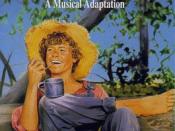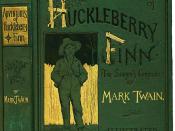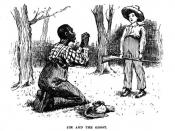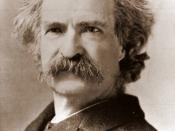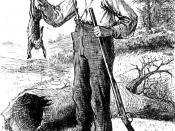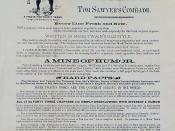Teen Runaways in Huckleberry Finn With every passing day, more teens resolve their problems with the urge of simply packing up and leaving. Runaways are not confined to a specific group or set of people; in fact, runaways come from every class, religion, and social background. It is a statistical fact that in the year 2000, at least 500,000 children ran away each year in the United States. (Whitebeck, Hoyt, & Yoder, 1999). These teens chose a life on their own over the life they were obligated to conform to at home. In the exploration for a viable relationship to a piece of literature, Mark Twains Huckleberry Finn was the most suitable choice for a comparison to runaway youth. Twain intimately investigates the dilemmas runaways face, through the situations and experiences Huckleberry Finn (the main character) is forced into. The primary struggles, which the reader can uncover, are circumstances that deal with parental abuse, seclusion and strong differences in opinion.
Mark Twain does an excellent job of depicting modern day runaways in the novel Huckleberry Finn.
Abuse is the leading cause of runaway youths, and it occurs frequently. According to the National Network of Runaway and Youth Services, family members have physically abused 70% of adolescents in shelters (Kennedy 1991). There are no positive aspects associated with this warped form of discipline. In its forms, verbal and physical, teens lose all self-confidence and become accustomed to the oppression they are put through. It is through the teenage years that kids start to realize that what they thought was normal was in fact abuse, and as a result running away without any repentance becomes their only answer. Twain puts Huckleberry Finn through the same state of affairs. On many occasions in the book Huckleberry points out the abuse that he suffers from his dad. A particular situation is very relevant in analyzing how Huckleberry felt concerning the coercion he faced. " He abused me a little for being slow"æthen I out with my saw and went back to work on that log again."à(Huckleberry Finn, pg 30). Huckleberry Finn spells out to the reader the extent of his abuse and how he reacted to the situation, in this case conforming to his fathers wishes or else face the consequences. As the story progressed Huckleberry Finn realizes that this abuse cannot continue, and resolving it could only be accomplished by planning an escape out of the cabin. "I got the thinking that if I could fix up some way to keep pap and the widow from trying to follow me, it would be certainer thing than trusting the luck to get far enough off before they missed me"æ"ÃÂ(Huckleberry Finn, pg 31). Being the only child also made running away an even more probable solution.
Seclusion is responsible for many teen runaways every year. Being lonely, without anyone to turn to is a very difficult thing for people, especially adolescence to undergo. Only having one other person in the house (e.g. father) sometimes makes conveying feelings difficult, depending on their personality. Running away is a solution to the problem of being misunderstood. Finding comfort amongst others that can relate and understand you better than what was given at home, justifies running away to youths. When Huckleberry Finn is forced to be alone we see him loathe the idea of staying with his father. "Once he locked me in and was gone for three days, it was dreadful lonesome"ÃÂ (Huckleberry Finn, pg 24). These bouts of seclusion contributed to Huckleberry Finn's disappearance from his short isolated life with his father, realizing that any reasoning with his father with respect to the issue of freedom would fail.
The last major issue that most modern day adolescents and Huckleberry Finn went through is differences of views. The Administration for Children, Youth and Families (ACYF) found that sixty five percent of all runaway in the United States said differences of opinion with parents or guardians were one of the main reasons for running. Adolescence feel helpless and dominated against authority figures (parents). They feel that there is no way they can win or even compromise, leaving independence the only option, and as a result running away. Huckleberry Finn went through the same conundrum. An excellent example of this occurs very early in the novel when the widow and Huckleberry Finn were quarrelling "Don't put your feet up there, Huckleberry; and don't scrunch up like that, Huckleberry "ÃÂ set up straight; and pretty soon she would say don't gap and stretch like that, Huckleberry "ÃÂ why don't you try to behave? Then she told me all about the bad place and I said I wished I was there"ÃÂ. (Huckleberry Finn, pg 04). This quotation proves that Huckleberry could not come to terms with all the conventions he was forced to abide by. Leaving running away a very pleasing solution to him.
Running away is the options more teens are turning to each day. It is through abuse, seclusion, and differences in opinion that modern teens, and in Mark Twains case, Huckleberry Finn, rationalize a new life on their own. Mark Twain does a first class job in illustrating what persuades youth to runaway.
